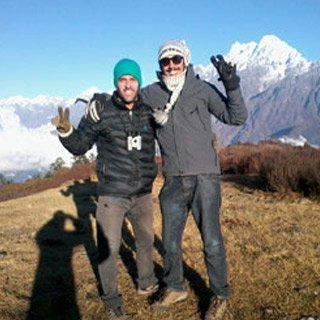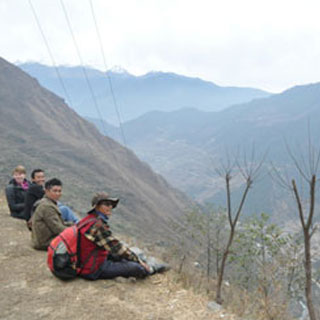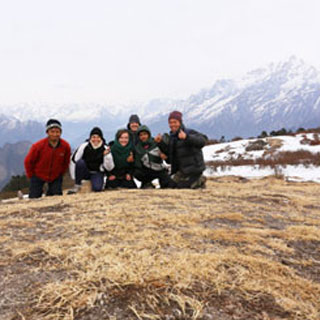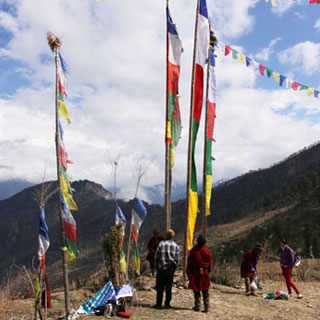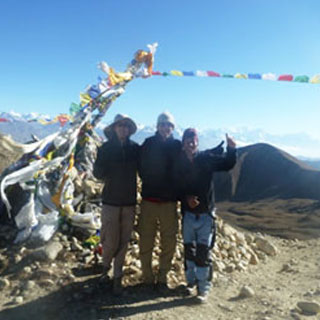Error, 404 !!!
Page not found
Sorry, the requested page is unavailable. Please try another page or link.
Traveler’s Says
We did the Langtang Valley Trek with Nyima Chhomo (the daughter of Durga Tamang) and were really happy with everything. We enjoyed having a female guide which is really uncommon in trekking in Nepal. The trek was stunning and well organized.… [More]
Hannah Kraft and Solveig Leas, GermanyDear Durga, The three of us are very well and have enjoyed this week a lot! I really liked how authentic it was. We shared some nice moments with the home owners, like seeing a freshly slaughtered hen getting prepared for… [More]
Guillaume Billardon, SwazilandMy husband & I booked a private trek
combining the Tamang Heritage & Langtang trails. Our guide, Nyima Chhomo, and porter, Dobar, were wonderful hosts throughout our 13 day adventure. Their local knowledge was evident and we were glad to have… [More]
Andrea ODonnell & Tim ODonnell, United StatesExcellent experience - Tamang Heritage Trek We took the Tamang Heritage trek September 2024 and it was a wonderful experience. The trip was organized as promised and the guide, Pasang, was exceptional. Pasang is from the local villages so knew many… [More]
Shareen Leland and Marian, United StatesBonjour Durga Tamang, Tout s’est bien passé à Katmandou, nous avons pu prendre le temps de visiter la ville tranquillement. Nous sommes rentrés un peu fatigués du trek mais nous sommes contents, c’était vraiment une bonne expérience et nous sommes ravis… [More]
Hélène Theodori et sa famille, Trekking, FranceDear Durga-- I hope this note finds you and your lovely family well. Happy New Year! Thank you very much for your good wishes a few weeks back. We all had covid in my family, and we are only just getting… [More]
Jennifer, AustraliaHello, Durga my friend. The trek was an amazing experience and despite having to shorten the trip we both are grateful for the experience. Both Krisna and Nyima were a big part of the reason that we had a great experience.… [More]
David William Merrifield, United StatesNamaste Tamang, I think Pasang is a really good guide, just a must take more attention for the most powerless person in a group. The guide has the responsibility for the tourist, and must be so slow during Trekking like the last… [More]
Ayu Mielke, GermanyOrginally I wanted to do some trekking but having only 14 days, I wanted to see Temples and World Heritage locations too, like where Buddha was born, so with Durga's help decided to do the 10 day "Exploring Hertiage side" and… [More]
Gary Michael Clark, United StatesCannot recommend enough! Durga is extremely friendly and went above and beyond to make our trip welcoming and smooth (not just on the trek- before and after as well)
Samdu (our guide) was extremely friendly and helpful, couldn't have done… [More]
The best thing you'll ever do! The trek was unbelievable, Durga was extremely welcoming, friendly and helpful. Making the whole thing so smooth. Samdu our guide was perfect, couldn't have been more helpful. Hassan our porter was amazing, I don't know… [More]
MR DANIEL HORROCKS, United KingdomGreat experience at Langtang Valley. Durga the owner took care of meeting all my requests and tailor-made the experience according to my needs. My guide was enthusiastic and nice. Highly recommended.
[More] Esteban Camargo, ColombiaTamang Heritage Trail, Langtang Valley Trek
Nach der Empfehlung im Stefan Loose Reiseführer hatten wir uns bereits zuhause bei der Vorbereitung unserer Reise mit Durga Tamang in Verbindung gesetzt. Das persönliche Gespräch in Kathmandu hat uns dann voll bestätigt, mit Himalayan… [More]
Heinz und Elisabeth, GermanyIt was my first visit to Nepal and I was anxious about my ability to manage the trek. I am 58 and keep active and fit but I am not used to the heights of the Himalayas. Thanks to Durga's care… [More]
Katherine Westfold, AustraliaChoosing Himalayan Unforgettable Adventure and Durga Tamang as our (local!) travel company and trekking guide was definitly the best decision for our Nepal trip. Not only that the trekking was organized in a thoughtful way! Durga showed us through spectacular landscapes… [More]
Leonhard Jungwirth, AustriaI came to Kathmandu with the idea in mind to do some trekking, but without having anything planned. When I first arrived there I got in touch with some agencies in Thamel but I didn't trust them much because they seemed… [More]
Allen, ItalyChoosing to have Durga guide my trekking partner and I was one of the best decisions Ive ever made. We trekked Langtang valley at the end of monsoon season and truly experienced the culture of the Nepali and Tibetan. Plus, you… [More]
Noah Willison, United States"Langtang valley Trek"
Mar 28th 2016 Namaste: We really enjoyed out trip to Langtang with you Durga Tamang. Everything was planned perfectly and we were thrilled to get the whole family onto the top of Kyanjin Ri. Langtang is safe now.
… [More]
"Tamang Heritage Trek"
May 17 2016 Namaste: Overall our experience in Nepal with you was really amazing, the days we spend in the Tamang Valley, walking around that beautiful views of mountain peaks, forests and little villages were the best part of… [More]
Oriol Fonos, SpainDonna and I had a great experience on our trek of the Annapurna circuit. The scenery, the trail, mountain villages, and the Nepalese people were exceptional as we expected.
Himalayan Unforgettable Adventure provided the transportation, guide, porters, meals and accommodation for… [More]
Bill and Donna Bauer, CanadaWhen we began planning our trip to Nepal in 2015 we began to quickly realise just how many decisions we were going to need to take to put together our itinerary, not least being the extensive options available to you when… [More]
Simon and Caroline, British Indian Ocean TerritoryIn October 2015, my husband and I went trekking in Nepal with our friends Bill and Donna. We were a private group and originally our plan was to hike the Langtang valley. We decided to book our trek through Durga Tamang who runs Himalayan… [More]
Anne and Harry Range, CanadaI just finished the Langtang Valley trek with Durga Tamang as my guide and Nima Lama as my smiling hard-working porter. Unfortunately, the weather was uncooperative – constant clouds, drizzle, mist – making mountain views elusive. (But even with that, I… [More]
Mike, United StatesDear Durga ,I want to say thank you so much for the outstanding trip up to the top of kala pather! We had sucha great time with you and Ram. You are an excellent guide and a wonderful person. We felt… [More]
Joe Michael and Kim, ItalyLe treck etait super! Nous sommes passes de village en village, les paysages sont magnifiques. Nous avons vu les differents métiers, des tisseuses, des bergers, des gens dans les cultures, le travail se fait a l’ancienne, c’ est tres interessant. Le… [More]
Jeanne, Jenny and Sarah, LuxembourgFebruary 10 2014 Namaste: We have very much appreciated an approach combining volunteering for RTEES during one week in the small Tamang village of Gatlang, and a 10 days trek in the Langtang valley, organized by Himalayan Unforgettable Adventure.
This… [More]
Isabelle and Alexis, FranceNamaste. We wanted to organise our trek before we arrived in Kathmandu, and after some extensive research came across Durga Tamang and his organisation (that are doing wonderful things for the villages of the Tamang Heritage Trail). Durga was very responsive… [More]
Nelly and Nathan, AustraliaNamaste. We wanted to organise our trek before we arrived in Kathmandu, and after some extensive research came across Durga Tamang and his organisation (that are doing wonderful things for the villages of the Tamang Heritage Trail). Durga was very responsive… [More]
Nelly and Nathan, AustraliaNamaste. We wanted to organise our trek before we arrived in Kathmandu, and after some extensive research came across Durga Tamang and his organisation (that are doing wonderful things for the villages of the Tamang Heritage Trail). Durga was very responsive… [More]
Nelly and Nathan, AustraliaWe contact Durga to make the Heritage Trail and Langtang Trail (1 march to 13 march 2014) and he offer us to go before starting the trek two days at his village, Gatlang, to see the LOSAR FESTIVAL (feb- march Buddhist… [More]
Margarida and Jorge, SpainThis was undoubtedly a unique, an unforgettable experience that I waited for years to fulfill. Thank you so much for turning it real and for showing me the simplicity and greatness of the Himalayan Tamangs and their own kingdom.
Making your… [More]
Miguel Buto, Portugal6 January 2014 Namaste. We wanted to organise our trek before we arrived in Kathmandu, and after some extensive research came across Durga Tamang and his organisation (that are doing wonderful things for the villages of the Tamang Heritage Trail). Durga… [More]
Nelly and Nathan, AustraliaThe highlight of our trip to Nepal was our amazing two week trek along the Tamang Heritage and Langtang trails. The scenery and moutain views in this area are absoutely gorgeous, something we will remember for years to come. The trip… [More]
Margit McLaughlin, United StatesWe contact Durga to make the Heritage Trail and Langtang Trail (1 march to 13 march 2014) and he offer us to go before starting the trek two days at his village, Gatlang, to see the LOSAR FESTIVAL (feb- march Buddhist… [More]
MARGARITA AND JORGE, SpainFebruary 10 2014 Namaste: We have very much appreciated an approach combining volunteering for RTEES during one week in the small Tamang village of Gatlang, and a 10 days trek in the Langtang valley, organized by Himalayan Unforgettable Adventure.
This approach… [More]
Isabelle and Alexis, FranceNamaste: We did the Heritage Trail and Langtang Valley Trail with Durga and his team and was a wondurful experience. That mountains are so beautiful and the village people are very friendly and kind. I really recommend do that trails with… [More]
Margarida and Jorge, FranceDate: 22 Oct 2013 Our Upper Mustang trek was an amazing experience both in terms of the unusual physical beauty and the ever-present stream of spirituality, especially in the extraordinary medieval city of Lo Manthang. Durga Tamang, our trekking guide, made… [More]
Mylo Schaaf and Dan Lowenstein, United StatesDurga is a really nice men. when we first met him we already had some bad experiences with tour guides in Kathmandu who tried to sell very hard there trekking trips. but durga wasn't like those man. he made directly a… [More]
Antilia and Luc, FranceTravelling alone, and with the idea of going trekking, I started to inform myself, which trail I should choose. I read about different treks and choose the Heritage Trail, because it is a relatively new trek, easy to walk and everyone… [More]
Michael, United StatesDurga is a really nice men. when we first met him we already had some bad experiences with tour guides in Kathmandu who tried to sell very hard there trekking trips. but durga wasn't like those man. he made directly a… [More]
Alex , Jana and Adrian, Germany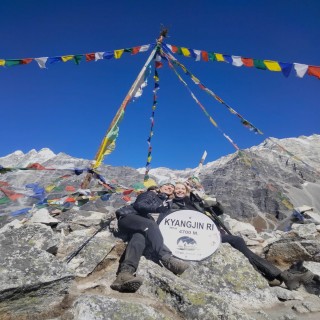
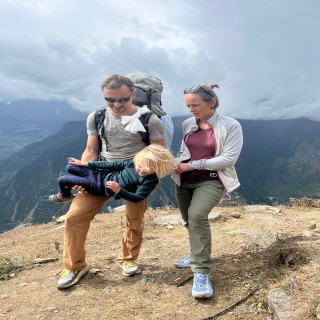
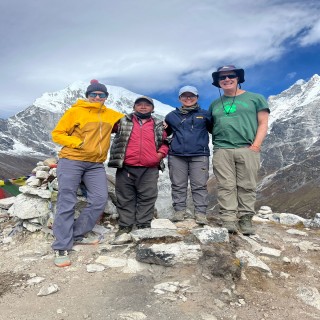
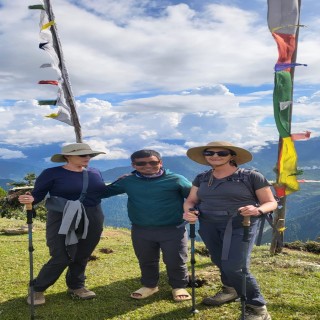
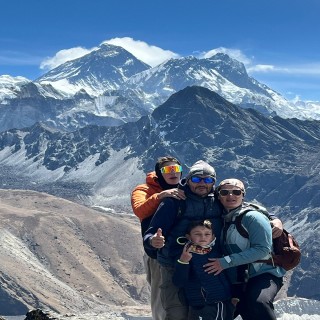

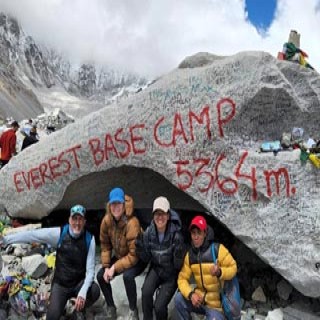
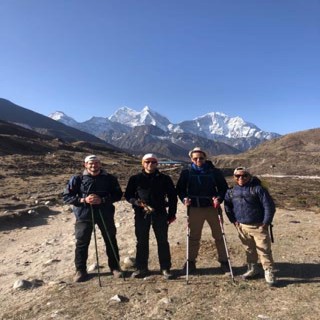
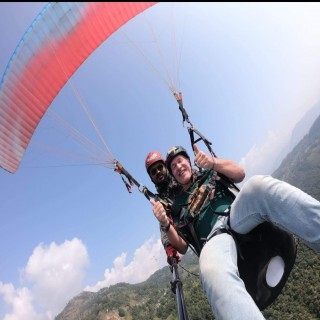
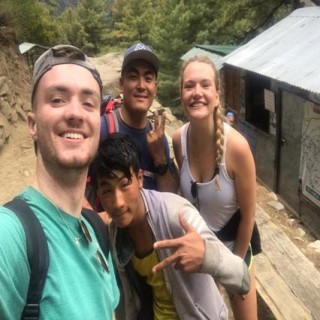

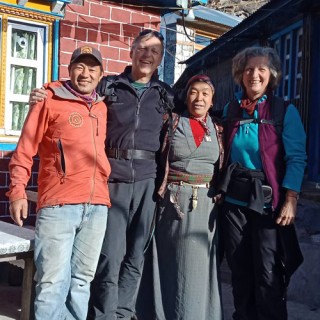
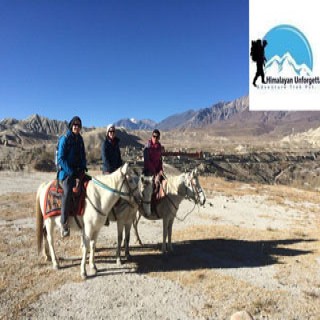
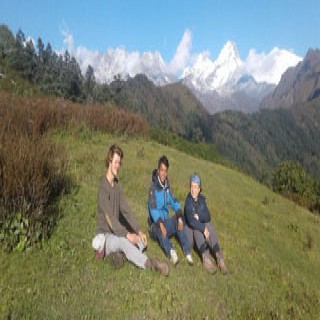
.jpg)
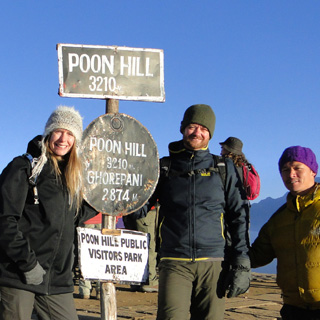
.jpg)



.jpg)

